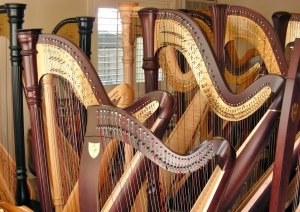 Before she ingloriously lost her head, Marie-Antoinette reigned over music in France in the Age of Enlightenment for nearly twenty years. She invited and actively supported foreign composers, and simultaneously fostered the great tragédie lyrique of Gluck alongside the opéa comique of Grétry and Monsigny. On a more personal level and in a private setting, Marie-Antoinette had a daily routine of playing on the harp or the harpsichord, with a good number of pieces written and dedicated to her.
Before she ingloriously lost her head, Marie-Antoinette reigned over music in France in the Age of Enlightenment for nearly twenty years. She invited and actively supported foreign composers, and simultaneously fostered the great tragédie lyrique of Gluck alongside the opéa comique of Grétry and Monsigny. On a more personal level and in a private setting, Marie-Antoinette had a daily routine of playing on the harp or the harpsichord, with a good number of pieces written and dedicated to her.
The harp was an extremely modern instrument and prominently featured in various salons around town. In many ways, it was poised to replace the harpsichord as the most popular instrument for domestic use. Soon, the instrument also appeared in the opera house, accompanying the newest ballets or being used on stage as an element of décor. And a tearful heroine pretending to strum the harp while lamenting the perils of love became a distinctive operative trope. The harp continued its march of triumph by taking the Concert Spirituel by storm. This first public concert series—which began in Paris in 1725 and ran until 1790—was a much lauded meeting place of international virtuosos. Among them was Francesco Petrini (1744-1819), member of a famous Berlin dynasty of harpists employed at the court of Frederick the Great. Francesco initially served as a chamber musician at the court of Mecklenburg-Schwerin, but moved to Paris in 1769. Earning his living as a teacher and performer, Petrini made his debut at the Concert Spirituel. He played a significant part in enriching the classical harp repertoire by publishing four concertos, four volumes of sonatas for violin and harp, duets, romances, and various sets of variations. Petrini even published a treatise on playing the harp, alongside other treatises on harmony.
Francesco Petrini: Harp Concerto No. 1, Op. 25
You May Also Like
- Unsung Concertos
Dmitri Kabalevsky: Cello Concerto No. 1, Op. 49 For primarily political reasons, the music of Dmitri Kabalevsky never really enjoyed great popularity in the West. - Unsung Concertos
Robert Schumann: Violin Concerto, WoO 23 One might reasonably assume that anything written by Robert Schumann for the concerto stage would be played the world over. - Unsung Concertos
Joseph Leopold Eybler: Clarinet Concerto (1798) The comparatively late addition of the clarinet family to our modern catalogue of musical instruments at the turn of the 18th century immediately spawned countless generations of woodwind virtuosi. - Unsung Concertos
Nikolaus Kraft: Cello Concerto No. 1 (1815) Antonín Kraft was one of the earliest cello superstars!
More Anecdotes
- Bach Babies in Music
Regina Susanna Bach (1742-1809) Learn about Bach's youngest surviving child - Bach Babies in Music
Johanna Carolina Bach (1737-81) Discover how family and crisis intersected in Bach's world - Bach Babies in Music
Johann Christian Bach (1735-1782) From Soho to the royal court: Johann Christian Bach's London success story - A Tour of Boston, 1924
Vernon Duke’s Homage to Boston Listen to pianist Scott Dunn bring this musical postcard to life
